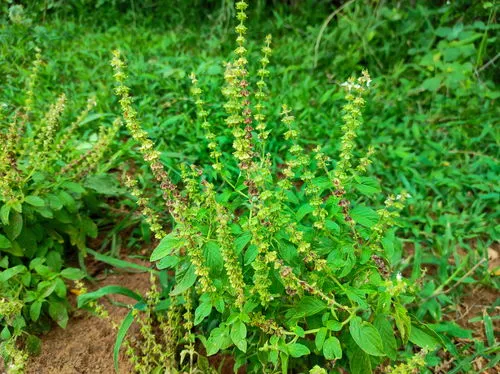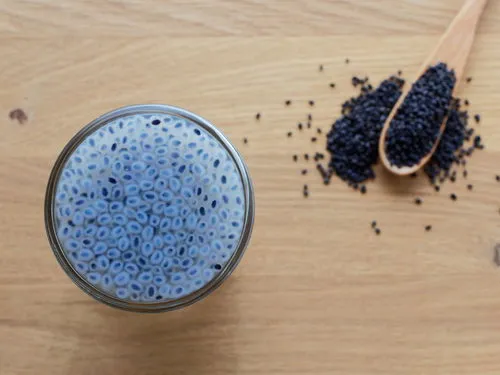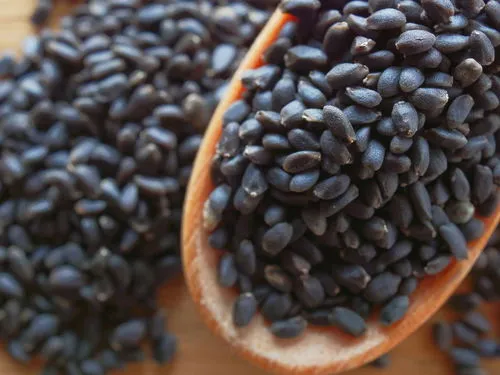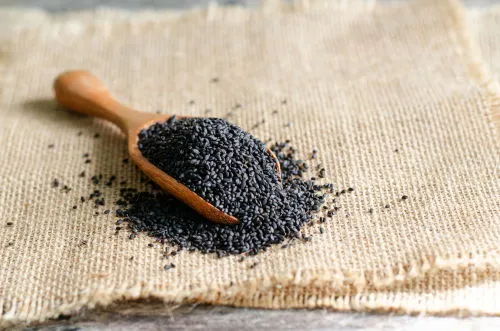The Ultimate Guide to Basil Seeds in Hindi: Benefits, Uses, and More
Basil seeds, known as Sabja seeds in Hindi, have gained immense popularity for their numerous health benefits. These tiny seeds, which resemble Chia seeds, are a powerhouse of nutrition and have been used traditionally in India and Southeast Asia for their medicinal properties. Let’s dive into the world of Sabja seeds and explore their benefits, nutritional value, and culinary uses.

What Are Sabja Seeds?
In India, the Sabja Seed plant is known by various names, including Babui Tulsi, Barbari, Gulal Tulsi, Kali Tulsi, Van Tulsi, Barbar, Sabja, and Takamariya. These seeds come from sweet Basil (Ocimum Basilicum) and are quite similar to black sesame (kala til) in shape, size, and color. They can be consumed raw or added to a variety of food items.
Nutritional Value of Sabja Seeds
Research shows that 100 grams of basil seeds from India contain:
- 14.8 grams of protein
- 13.8 grams of lipids
- 63.8 grams of carbohydrates
- 22.6 grams of fiber
Minerals in 100 grams of basil seeds include:
- 2.27 milligrams of iron
- 31.55 milligrams of magnesium
- 1.58 milligrams of zinc
100 grams of basil seeds from India contain roughly 442 calories. They are a great source of calcium, magnesium, and iron. One tablespoon (13 grams) of basil seeds supplies 15% of the Reference Daily Intake (RDI) for calcium and 10% of the RDI for magnesium and iron.
High in Fiber
Basil seeds are high in fiber, especially soluble fiber like pectin.
Plant Compounds
Sabja seeds contain flavonoids and other polyphenols.
Omega-3 Fat
About 13 grams of basil seeds carry an average of 2.5 grams of fat, half of which is alpha-linolenic acid (ALA), an omega-3 fat.

Benefits of Sabja Seeds
With a long history of use in Ayurvedic and Chinese medicine, Sabja seeds are well known for their healing properties. Here are some of the benefits:
Effective for Weight Loss
Alpha-linolenic acid-rich Sabja seeds speed up the body’s fat-burning metabolism. Its fiber-rich composition keeps you feeling full for a long duration, curbing the urge for unhealthy snacking.
Detoxifies the Body
Sabja seeds help in detoxifying the body by flushing out toxins.
Minimizes Body Heat
These seeds are known to have a cooling effect on the body, making them ideal for consumption during the summer months.
Promotes Digestion
Sabja seeds aid in digestion and help regulate bowel movements.
Treats Skin Conditions
They are effective in treating skin conditions like eczema and psoriasis.
Promotes Hair Growth
Sabja seeds are great for hair growth due to their high protein and iron content.
Treats Cough and Cold
These seeds help in treating cough and the common cold.
Promotes Bone Health
Rich in calcium, Sabja seeds promote bone health.
Great for Muscle Function
The magnesium content in Sabja seeds is beneficial for muscle function.
Anti-Inflammatory Properties
Sabja seeds have anti-inflammatory properties that can help reduce inflammation in the body.
Anti-Cancer Properties
Some studies suggest that Sabja seeds may have anti-cancer properties.
Supports Blood Sugar Control
Sabja seeds may help in controlling blood sugar levels.
Improves Cholesterol
These seeds may help in improving cholesterol levels.

Culinary Uses of Sabja Seeds
You can use Sabja seeds in various culinary creations:
- Lemonades
- Smoothies
- Ice cream
- Milkshakes
- Jellies
- Whipping cream
- Soups
- Salad dressings
- Yoghurt
- Pudding
- Cereal
- Pancakes
- Pasta dishes
- Bread
- Muffins

Basil Seeds vs. Chia Seeds
Sabja seeds are often confused with Chia seeds. However, the two are different with certain similar properties, including a near-match nutritional profile.
Nutritional Comparison
| Nutritional Components | Chia Seed | Basil Seed |
|---|---|---|
| Calories | 60 | 60 |
| Fat | 3 gm | 2.5 gm |
| Omega-3 Fat | 2,880 mg | 1,240 mg |
| Fiber | 5 gm | 7 gm |
| Calcium | 8% of RDI | 15% of RDI |
| Magnesium | 8% of RDI | 10% of RDI |
| Iron | 9% of RDI | 10% of RDI |
| Protein | 3 gm | 2 gm |
| Carbs | 5 gm | 7 gm |
Side Effects of Sabja Seeds
While Sabja seeds are highly beneficial, they can have side effects if consumed in large quantities:
- High fiber content may cause bloating, diarrhea, and abdominal cramps.
- Can interfere with blood-thinning medication due to the high Vitamin K component.
- Potential choking risk for children and the elderly with swallowing difficulties.
Ideal Dosage of Sabja Seeds
The ideal daily intake of Sabja seeds can differ based on individual health, dietary needs, and specific health conditions. Generally, consuming around 1 to 2 tablespoons (approximately 15 to 30 grams) per day is a good guideline. Begin with a smaller amount and gradually increase it as you become more comfortable and can tolerate it better. As with any new dietary supplement, it is recommended to consult with a healthcare professional or nutritionist to receive personalized advice tailored to your specific health needs.
How to Include Sabja Seeds in Your Diet
Here are some common ways to incorporate Sabja seeds into your diet:
Soaked in Water
Add about 1 tablespoon of Sabja seeds to a cup of water. Let them soak for 15-20 minutes until they swell and form a gel-like substance. Consume the seeds along with the gel.
Added to Beverages
Sprinkle a teaspoon of Sabja seeds into drinks like fruit juices, lemonade, smoothies, or milkshakes. Allow the seeds to swell before consuming.
Mixed in Yoghurt
Add soaked Sabja seeds to a bowl of yoghurt. Combine with fruits and nuts for a nutritious snack.
Added to Desserts
Use Sabja seeds as a topping or ingredient in desserts like ice creams, puddings, or falooda. They provide a unique texture and nutritional boost.
Sprinkled on Salads
Sprinkle a teaspoon of Sabja seeds onto your salads for extra crunch and nutritional value.
Conclusion
Sabja seeds, also known as basil seeds, have been valued for their nutritional and medicinal properties for centuries, particularly in India and Southeast Asia. These small but mighty seeds are packed with protein, fiber, omega-3 fats, and essential minerals, making them a powerhouse of nutrition. Their versatile nature allows them to be incorporated into various culinary creations, from beverages and desserts to salads and main dishes. The benefits of Sabja seeds are extensive, ranging from weight loss and improved digestion to enhanced hair growth and potential anti-inflammatory effects. However, it’s important to consume them in moderation, as excessive intake can lead to side effects such as bloating and potential interactions with certain medications.
(With additional inputs by Dhwani Meharchandani)
| Got any questions or point of view on our article? We would love to hear from you. Write to our Editor-in-Chief Rajat Piplewar at [email protected] |
